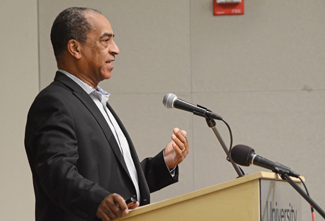MLK keynote speaker touches on media coverage of recent events
To coincide with the 21st annual Martin Luther King Jr. Day, journalist and president of the National Association of Black Journalists (NABJ) Robert Butler spoke to a crowd of eager students and faculty members about the importance of having diversity in the media.
His presentation, titled “Race, Ethics and the Media,” centered on how newsrooms across the world need to be diverse to produce representative and balanced content.
“The way stories are reported really makes a difference,” Butler said.

Nathan Romans | Argonaut
Bob Butler, a reporter for KCBS Radio in San Francisco and president of the National Association of Black Journalists, delivers the keynote speech Thursday in the Clearwater/Whiterwater room to kick off the Martin Luther King Jr. Day events on the University of Idaho Campus.
To illustrate his point, Butler shared an example of a recent news broadcast about an anti-police protest in Washington, D.C. one day after the murders of two Brooklyn police officers, whose deaths were reportedly an act of “revenge” for the shootings of Michael Brown and Eric Garner.
Butler said the anchor of the broadcast reported the group of protestors were supposedly chanting the words “We won’t stop, we can’t stop, so kill a cop.” He said evidence later showed the organization edited and cut out the rest of the chant to make the context of the protest seem more radical than it was.
Butler said the original chant was, “We won’t stop, we can’t stop, till killer cops are in cellblocks.”
Butler is an independent journalist who works at KCBS Radio in San Francisco, California, and holds a bachelor’s degree from San Francisco State University. Butler served as an investigative reporter on the award-winning Chauncey Bailey Project and is currently finishing up his term as president of NABJ.
Butler said media properties are encouraged to accurately reflect the areas they serve in order to get fair coverage — and if they don’t get it, ethical concerns arise.
Butler shared another anecdote that portrayed the importance of fair news coverage on racially sensitive stories. He said approximately three years ago there was a drive-by shooting in Chicago and a local news station decided to put an African-American 4-year-old boy on the air.
Reporters asked him if he was scared about what happened and the boy said he wasn’t and when he was older, he would have a gun, too. Butler said the news outlet made the implication that the boy would grow up to be a “gangbanger,” when in the original recording, the boy said he wanted to have a gun because he wanted to be a police officer when he grew up.
In light of skewed media coverage, Butler said he later started a “diversity census,” where one can look at news station’s management teams to see what race they are. In the Chicago incident, Butler said every member of the management team was white, which he said can be perceived as unrepresentative. Butler said the report also found more than half of nationwide news stations do not have racially diverse newsrooms.
“I got no problem with having no diversity in Spokane, or here in Moscow,” Butler said. “Because you don’t have much diversity in town, but I got a big problem if it’s Chicago, New York or Washington, D.C.”
Butler explained how stations have to renew their licenses every seven years, and if enough people complain about a station’s work, those complaints go on the organization’s public file where the company could lose its license.
“When you falsify the news, when you lie to your viewers, that should be cause to lose your license,” Butler said. “There has not been one station to lose its license, as far as I know, in the past 20, 30 years … we have not done a good job as a public of holding the stations accountable. It’s our job to do that.”
Emily Mosset can be reached at [email protected]